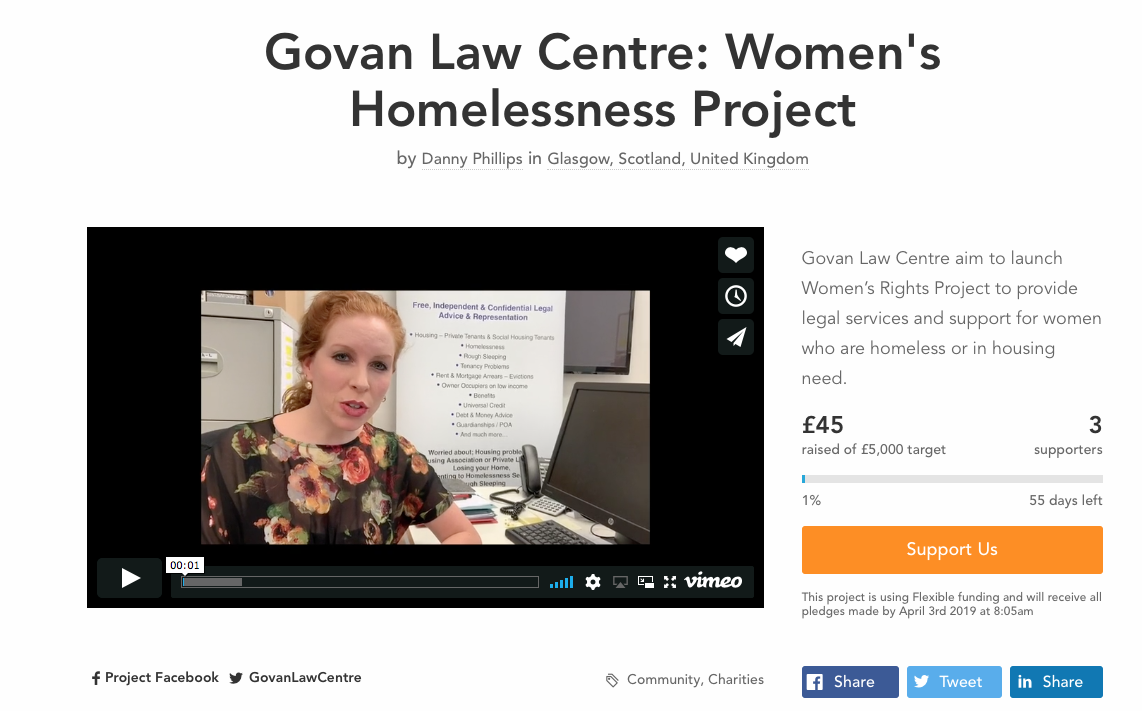 Hogmanay marks the abolition of the priority need test in homelessness law, and the crystallisation of the Scottish Government’s promise to 'end homelessness' in Scotland. Any individual who becomes homeless unintentionally has been promised the right to a home. What does this promise mean in practice? Will people really have the right to a permanent home in Scotland?
Hogmanay marks the abolition of the priority need test in homelessness law, and the crystallisation of the Scottish Government’s promise to 'end homelessness' in Scotland. Any individual who becomes homeless unintentionally has been promised the right to a home. What does this promise mean in practice? Will people really have the right to a permanent home in Scotland?Sunday 30 December 2012
An end to homelessness in Scotland?
 Hogmanay marks the abolition of the priority need test in homelessness law, and the crystallisation of the Scottish Government’s promise to 'end homelessness' in Scotland. Any individual who becomes homeless unintentionally has been promised the right to a home. What does this promise mean in practice? Will people really have the right to a permanent home in Scotland?
Hogmanay marks the abolition of the priority need test in homelessness law, and the crystallisation of the Scottish Government’s promise to 'end homelessness' in Scotland. Any individual who becomes homeless unintentionally has been promised the right to a home. What does this promise mean in practice? Will people really have the right to a permanent home in Scotland?Saturday 29 December 2012
GLC campaign for lenders to reimburse unfair mortgage fees in Scotland
 Banks are facing compensation claims of up to £30m from Scottish mortgage customers hit by "unfair, immoral and unethical' fees and charges added to their mortgages after court actions were dismissed by lenders for technical reasons. Govan Law Centre's (GLC) campaign to stop Scottish consumers being 'double charged' for mortgage expenses has been reported in The Herald (Sat, 29 December 2012).
Banks are facing compensation claims of up to £30m from Scottish mortgage customers hit by "unfair, immoral and unethical' fees and charges added to their mortgages after court actions were dismissed by lenders for technical reasons. Govan Law Centre's (GLC) campaign to stop Scottish consumers being 'double charged' for mortgage expenses has been reported in The Herald (Sat, 29 December 2012).GLC believes that the issue here is fairness, and that incompetent or defective proceedings cannot be the fault of consumers; rather it is the responsibility of lenders and their Scottish solicitors. GLC considers it to be unfair, immoral, and unethical for Scottish solicitors and UK lenders to profit twice by 'double-charging' Scottish consumers who are in financial difficulties.
GLC has set up a simple self-help website for affected customers or their advisors to seek free refunds.
The Council of Mortgage Lenders told The Herald that if costs were not added to mortgage accounts "then all customers would effectively end up paying for them, which many would regard as unfair and inappropriate". The Herald's own editorial has argued that this approach "fails to recognise the only fair and appropriate way for the charge to be borne is by the institutions whose incompetence caused the actions to fail". The Herald goes on to argue that:
 "Mike Dailly of Govan Law Centre, the solicitor who is leading the campaign to recover the charges levied for failed actions, is entirely justified in condemning the lenders and criticising their solicitors as "unfair, immoral, and unethical" in double-charging Scottish consumers who are in financial difficulties".
"Mike Dailly of Govan Law Centre, the solicitor who is leading the campaign to recover the charges levied for failed actions, is entirely justified in condemning the lenders and criticising their solicitors as "unfair, immoral, and unethical" in double-charging Scottish consumers who are in financial difficulties".GLC campaign for lenders to reimburse unfair mortgage fees in Scotland
Tuesday 18 December 2012
Shelter Scotland and STUC endorse 'No eviction for bedroom tax' campaign
 GLC is delighted that Shelter Scotland and the STUC have endorsed the principles of the 'No eviction for bedroom tax' campaign, which is already supported by local tenants and residents in Glasgow, following two public meetings in Govan.
GLC is delighted that Shelter Scotland and the STUC have endorsed the principles of the 'No eviction for bedroom tax' campaign, which is already supported by local tenants and residents in Glasgow, following two public meetings in Govan.GLC had suggested the need for urgent minor law reform amendment to implement a 'No eviction for bedroom tax' policy in Scotland, upon the basis the bedroom tax cuts would be affecting tenants within 4 months or so, and Scotland needed a new safety net otherwise we would be unable to prevent evictions based on rent arrears caused by the bedroom tax.
Many defended eviction actions in court can often turn on £3.55 per week payments to arrears, and with £12 to £22 per week being deducted from housing benefit it could become almost impossible to defend such eviction actions in the near future.
GLC has suggested bedroom tax rent arrears could be pursued as an ordinary debt, and should not be founded upon as a ground of eviction or to establish the reasonableness of local authority and housing association evictions. Such a policy could either be considered on a permanent or transitional basis with a sunset clause.
The support from Shelter Scotland and the STUC to this proposal is very welcome and will help forge much wider civic Scottish support to the 'No eviction for bedroom tax' campaign.
Shelter Scotland and STUC endorse 'No eviction for bedroom tax' campaign
Friday 14 December 2012
Glasgow mortgage repossession action dismissed for failing to comply with Consumer Credit Act
 A sheriff at Glasgow Sheriff Court has dismissed a mortgage repossession action concerning two 'second charge' secured loans for failing to comply with sections 87-88 of the Consumer Credit Act 1974 (CCA) and the Consumer Credit (Enforcement, Default and Termination Notices) Regulations 1983 as amended.
A sheriff at Glasgow Sheriff Court has dismissed a mortgage repossession action concerning two 'second charge' secured loans for failing to comply with sections 87-88 of the Consumer Credit Act 1974 (CCA) and the Consumer Credit (Enforcement, Default and Termination Notices) Regulations 1983 as amended.In the case of Citifinancial Europe plc v. Rice, Sheriff Deutsch pronounced a judgment which found that the section 87 default notice served under the CCA was defective and incompetent because it failed to properly identify the loan agreements, the parties to the agreements, and failed to provide clear specification of the matters complained of.
The court distinguished the present case from American Express v. Brandon, where a defect in a default notice was overlooked as de minimus and non-prejudicial. While such arguments were possible in Sheriff Deutsch's opinion, in the present case the errors were 'fundamental' and the action for possession fell to be dismissed.
The pursuers were represented by Aberdein Considine & Co., Solicitors (Gordon), while the defender was represented by Govan Law Centre (Dailly).
Glasgow mortgage repossession action dismissed for failing to comply with Consumer Credit Act
Tuesday 4 December 2012
Glasgow University Law School Ethics Colloquium
 GLC's Principal Solicitor has delivered a speech today at the University of Glasgow's Ethics Colloquium on behalf of the UK's Financial Services Consumer Panel.
GLC's Principal Solicitor has delivered a speech today at the University of Glasgow's Ethics Colloquium on behalf of the UK's Financial Services Consumer Panel.Mike suggested that many of our financial scandals and problems can be traced back to a lack of professional ethics in our banking system, and that ethical failure was a causa causans of so many of the UK's and international communities recent financial problems. Mike's speech is available here. (Mike's evidence on behalf of the FSCP to the Parliamentary Commission on Banking Standards is here).
For over four years now the UK has been hit, virtually weekly, by corporate scandals and failures attributable arguably to a lack of ethical behaviour at high levels. The Bank of Scotland, The Metropolitan Police, Arthur Andersen, Lloyds, South Yorkshire Police, BBC, Glasgow Rangers, HBOS, News International, MPs expenses and LIBOR rate fixing.
Glasgow University's colloquium has sought to analyse the causes of this culture and if this is now a permanent state of affairs or an issue which can be addressed. Can others learn from the medical and legal professions? Is there a role for education as well as regulation and sanction?
Held in the Court and Senate Suite of the University the event heard from high profile speakers from business, the professions and academia seeking to address the downward cycle of public and business behaviour. The speakers included:
· Sir Kenneth Calman, Chancellor, University of Glasgow, and former Chief Medical Officer for England; and Scotland
· Emeritus Professor Stewart Hamilton, IMD, Switzerland
· Harry Reid, The Herald
· Bruce Ritchie, Law Society of Scotland
· Mike Dailly, Financial Services Consumer Panel
· Tom Craig, Craig Corporate
· Douglas Mill, University of Glasgow, School of Law
Glasgow University Law School Ethics Colloquium
Sunday 2 December 2012
GLC encourages Scottish homeowners to reclaim millions of pounds in unfair legal expenses
 Many of the
several thousand Scottish homeowners taken to court for mortgage repossession
over the last few years, have had their cases dismissed and then re-raised for
technical reasons.
Many of the
several thousand Scottish homeowners taken to court for mortgage repossession
over the last few years, have had their cases dismissed and then re-raised for
technical reasons.Govan Law Centre believes they may have been unfairly charged twice for their lender's legal expenses along with additional administrative charges.
GLC will be launching a straight forward campaign and website to help consumers reclaim the 'repeat' legal expenses and charges added to their mortgage accounts, at a Scottish repossession conference hosted in Glasgow on Monday 3 December 2012 by Carrington Dean.
GLC's Principal Solicitor, Mike Dailly said: "Where a lender has raised incompetent proceedings, or deserts those proceedings to re-raise again, how can they reasonably expect their customers to pay for being taken to court twice? We think passing on these repeat or double charges to Scottish consumers is clearly unfair in relation to the Financial Services Authority's (FSA) Principles of Business. The extra costs involved here add up to many millions of pounds which Scottish homeowners should not have to bear".
The reclaim mini-site is available online here.
GLC encourages Scottish homeowners to reclaim millions of pounds in unfair legal expenses
Wednesday 28 November 2012
Cross-party agreement to consider 'no bedroom tax eviction' policy in Scotland
 Last night, a packed Mary Barbour Hall in Govan's Pearce Institute heard the heartfelt concerns from local tenants frightened for their families future with the 'bedroom tax' cuts, due next April.
Last night, a packed Mary Barbour Hall in Govan's Pearce Institute heard the heartfelt concerns from local tenants frightened for their families future with the 'bedroom tax' cuts, due next April.The cuts will see those who are retired, working, or in receipt of benefits, receive housing benefit cuts of £48 per month from their rent, and in some cases £88 per month.
 |
| Humza Yousaf MSP |
There was a unanimous consensus from the panel and members of the public at the meeting, that the 'under-occupancy' housing benefit reforms were irrational and morally wrong, would unfairly force families to give up their homes of many years, and would ultimately lead to an increase in evictions and homelessness across Scotland.
 |
| Johann Lamont MSP |
The STUC's Dave Moxham reflected on the need to look at rent capping in the private sector and much stronger rent regulation. He noted that levels of child poverty and equality of pay was actually better-off in 1979 than it was today, and how we needed a fightback in the spirit of those of the 1915 Glasgow rent strike, which included Govan's Mary Barbour. Kenny McLeod explained that 75% of Scottish housing associations relied on housing benefit for more than half of their operational revenue, and that many tenants were already borrowing from high interest home credit lenders.
John Flanagan emphasised the need for all stakeholders and campaigners to come together to work with a united front. This was echoed by the chairman of the meeting, John Foster, and the meeting resolved to form a steering committee to take forward a united campaign on behalf of Glasgow tenants. Govan Law Centre (GLC) agreed to provide full support and backing to the steering committee.
 |
| Members of the public in Govan's Mary Barbour Hall |
Mike explained that at the moment defended eviction actions in court can often turn on £3.55 per week payments to arrears, and with £12 to £22 per week being deducted from housing benefit it could become almost impossible to defend such eviction actions in future.
Both Humza Yousaf and Johann Lamont agreed to consider the feasibility of GLC's law reform proposal which was backed by those present at the public meeting. GLC has suggested bedroom tax rent arrears could be pursued as an ordinary debt, and should not be founded upon as a ground of eviction or to establish the reasonableness of local authority and housing association evictions. Such a policy could either be considered on a permanent or transitional basis with a sunset clause.
The meeting was organised by the tenants and residents associations of Govan and Linthouse, and the Govan Communnity Council.
* GLC's briefing paper and proposed statutory amendment is online here (opens as a PDF).
Cross-party agreement to consider 'no bedroom tax eviction' policy in Scotland
Tuesday 27 November 2012
Friday 23 November 2012
Pre-Action Requirements in rent arrears cases may make it easier to evict
 Govan Law Centre (GLC) is launching an advice leaflet today aimed at local tenants in Glasgow who get into financial difficulties and accrue arrears of rent. Although the Scottish Government's new 'Pre-Action Requirements' (PAR) for rent arrears came into force on 1st August 2012, the PAR only apply to eviction actions where a notice of proceedings was served on or after 1 August.
Govan Law Centre (GLC) is launching an advice leaflet today aimed at local tenants in Glasgow who get into financial difficulties and accrue arrears of rent. Although the Scottish Government's new 'Pre-Action Requirements' (PAR) for rent arrears came into force on 1st August 2012, the PAR only apply to eviction actions where a notice of proceedings was served on or after 1 August. Because of the time it takes to raise court proceedings we are still seeing cases calling in Glasgow next week with notices served before 1 August. Accordingly, GLC expects to see the PAR feature in most rent arrears eviction cases in Scotland shortly. The PAR are well intentioned and designed to prevent eviction cases being raised in the first place by requiring councils and housing associations to undertake a number of activities to attempt to avoid litigation.
Flaw in the Pre-Action Requirements for rent arrears
However, we believe there is a major flaw and weakness in the PAR which may have the perverse effect of making it much easier for landlords to secure a decrees for eviction in those cases which come to court. All of the PAR activities must take place before a notice of proceedings is served, such as negotiating a repayment plan. Some of the duties, such as the landlord's requirement to help the tenant with a housing benefit application only engage 'if requested' by the tenant.
Need for free independent advice
Unless a tenant obtains independent advice at the time of the PAR there is a very real danger they will enter into an unaffordable repayment plan, fail to formally request housing benefit assistance or fail to engage. We know this from our casework experience over the last two decades; landlords invariably want arrears repaid more quickly than tenants can realistically afford. And we also know that tenants do not seek out independent advice at the early stage of the PAR - typically law centres and advice agencies are approached just before or when proceedings are raised.
What does this mean in practice?
GLC is concerned that many tenants will fail to properly utilise the PAR without good independent advice. If this happens the perverse affect of the PAR is to give the landlord a powerful audit trail and new argument for why it is now reasonable to evict. A key flaw in the PAR is that even if a tenant approaches us before their case calls in court it is purely a matter of discretion on the part of the landlord whether to re-engage the PAR.
The 2012 PAR Order clearly states the landlord's duties are pre-notice of proceedings, yet five months may have passed after that point in time before a summons is raised, and it may be another two months before the case calls in court. Scottish Government guidance recognises this weakness, but simply states it is up to the landlord to decide whether to engage the PAR activities.
There is a very real risk the PAR could become a formal box ticking exercise which enables a landlord to demonstrate how reasonable it has been.
Solutions?
The PAR will only have any traction and policy impact if tenants obtain advice when the PAR engage. Accordingly, GLC will undertake local awareness raising through a variety of channels. We need to get the messages across that tenants need to take up their PAR rights and take independent advice. Our new leaflet attempts to sets out these messages in clear and accessible terms.
Ultimately, we believe the best solution to ensure the policy intention of the PAR is achieved would be to amend the 2003 Homelessness etc., (Scotland) Act to require housing associations to notify the council - akin to section 11 notifications - when they engage the PAR in any case. That would enable the local authority to facilitate an independent intervention. GLC intends to take this initiative up with the Scottish Government.
Pre-Action Requirements in rent arrears cases may make it easier to evict
Monday 12 November 2012
Guilty until proven innocent through the payment of fees? - access to justice in Scotland
 With the second stage of the Scottish Civil Justice Council and Criminal Legal Assistance Bill before the Scottish Parliament tomorrow (Tuesday, 13 November 2012) it is important to consider whether a fundamental principle of Scots law - 'innocent until proven guilty' - will remain intact in Scotland if this Bill is passed as currently drafted.
With the second stage of the Scottish Civil Justice Council and Criminal Legal Assistance Bill before the Scottish Parliament tomorrow (Tuesday, 13 November 2012) it is important to consider whether a fundamental principle of Scots law - 'innocent until proven guilty' - will remain intact in Scotland if this Bill is passed as currently drafted.Govan Law Centre does not undertake criminal defence work as a community controlled charitable law centre; our focus is on initiatives to tackle social injustice, disadvantage and discrimination. Yet, injustice is injustice whether civil or criminal in our society; and people are people.
The present proposals by the Scottish Government would see anyone in Scotland accused of a crime having to pay upfront fees for their defence where their disposable income was £68 per week or more to obtain criminal legal aid.
Furthermore, such upfront contributions for criminal legal aid would have to be collected by the accused's solicitor. At present the Scottish Legal Aid Board (SLAB) are paid by the taxpayer to collect similar civil legal aid contributions. Why should criminal legal aid contributions be different?
It makes no sense for solicitors to undertake debt collection work which the taxpayer presently pays SLAB to undertake. Moreover, forcing those who are defending accused persons to collect upfront fees creates an inherent flaw, which requires defence solicitors to cease from acting where fees are not paid. Such an approach introduces a systemic blockage into Scotland's criminal defence system which cannot be compliant with Article 6 of the European Convention on Human Rights.
Ultimately, how can it be just for citizens up against the power of the State in Scotland to be denied access to justice for the inability of paying legal fees? How can it be just for people with disposable incomes as low as £68 per week to be required to pay for their defence in a criminal case? Incredibly, how can it be right that those found innocent or not proven of an alleged crime still have to pay fees?
We believe that the Scottish Government are in danger of undermining a precious tenent of Scots law - the principle of 'innocent until proven guilty' - with the risk that many Scots may be deemed guilty in the future unless able to pay a fee to be proved innocent.
Guilty until proven innocent through the payment of fees? - access to justice in Scotland
Thursday 25 October 2012
Widespread support for Scottish Government to act to protect Scots from payday loan and high interest lenders
 A very wide range of organisations met yesterday in the Scottish Parliament at Kez Dugdale MSP's Debtbusters meeting to discuss how we can protect Scots from the usury practices of payday lenders and high interest credit providers. In attendance were MSPs, councillors, and representatives from the Accountant in Bankruptcy, the Scottish Trades Union Congress, credit unions, Citizens Advice, the Church of Scotland, welfare rights advisors, the Law Society of Scotland, Carrington Dean insolvency practitoners, and Money Advice Scotland.
A very wide range of organisations met yesterday in the Scottish Parliament at Kez Dugdale MSP's Debtbusters meeting to discuss how we can protect Scots from the usury practices of payday lenders and high interest credit providers. In attendance were MSPs, councillors, and representatives from the Accountant in Bankruptcy, the Scottish Trades Union Congress, credit unions, Citizens Advice, the Church of Scotland, welfare rights advisors, the Law Society of Scotland, Carrington Dean insolvency practitoners, and Money Advice Scotland.Attendees heard an update on the campaign work of Kez Dugdale MSP and Stella Creasy MP on attempts to protect consumers from the exploitative practices of payday lenders in Scotland and the UK. The Scottish campaign was backed by the Leader of the Scottish Labour Party, Johann Lamont MSP who addressed the meeting, along with Margo MacDonald MSP, a fierce critic of usury lenders.
Govan Law Centre's Principal Solicitor, Mike Dailly, spoke to GLC's paper on Fast track Debt Arrangement Scheme to provide more flexible respite and a better escape route for Scots entrapped in toxic payday loans. A clear outcome from the meeting was the Scottish Government had to act, and we needed a multifaceted approach including:
- amending and improving the Debt Arrangement Scheme to better tackle the consumer detriment from payday loans (particularly so that interest and charges can be frozen from the very outset, whereas at present this can only happen on approval of a debt payment plan);
- a Scottish public 'wealth warning' campaign about payday loans, and much better financial education in Scotland, targeted at the payday loan demographic;
- the promotion of responsible credit union lending, with local government support through all tools available, and Scottish Government backing for a 'guaranteed loan fund' to enable credit unions to compete with payday lenders in the public interest.
 GLC's Mike Dailly said: "Two and half thousands year ago the Romans capped interest rates at around 8.3%. It's hard to believe we've allowed toxic payday loans to flourish in 21st century Britain, with citizens bring charged up to 5,000% APR. Many states in America have banned these products, and in 2007 Congress introduced a law to ban payday loans for military personnel because it was seen as a national security issue. We believe it is a national financial health issue in Scotland".
GLC's Mike Dailly said: "Two and half thousands year ago the Romans capped interest rates at around 8.3%. It's hard to believe we've allowed toxic payday loans to flourish in 21st century Britain, with citizens bring charged up to 5,000% APR. Many states in America have banned these products, and in 2007 Congress introduced a law to ban payday loans for military personnel because it was seen as a national security issue. We believe it is a national financial health issue in Scotland". A full report report from the meeting has being prepared by Kez Dugdale's office, together with the next steps for the Scottish campaign, which Govan Law Centre fully supports.
Widespread support for Scottish Government to act to protect Scots from payday loan and high interest lenders
Tuesday 23 October 2012
Scottish Parliament: consensus for change at the Fair Access to the Legal Profession event
 The student-led Campaign for Fair Access to the Legal Profession's (CFALP) event in the Scottish Parliament witnessed a remarkable consensus for progressive change from SNP, Labour and Lib-Dem MSPs, members of the Scottish legal profession, university representatives, civic society groups and law students tonight (23 October 2012).
The student-led Campaign for Fair Access to the Legal Profession's (CFALP) event in the Scottish Parliament witnessed a remarkable consensus for progressive change from SNP, Labour and Lib-Dem MSPs, members of the Scottish legal profession, university representatives, civic society groups and law students tonight (23 October 2012). The event hosted by the SNP's Edinburgh Central MSP, Marco Biagi heard from two fourth year law students who were now faced with the harsh prospect of being priced out of the Diploma (PEAT 1) after the Cabinet Secretary for Education, Mike Russell, moved their funding goal posts and any hope of being able to afford to complete the mandatory PEAT 1. The voice of law students shortly to be excluded from Scotland's legal profession because of an unfair change in the funding arrangements was met with overwhelming support in a packed Committee Room 6 in the Scottish Parliament.
The event also included speeches from CFALP's campaign co-ordinator, Tim Haddow, NUS Scotland President, Robin Parker, and GLC's Principal Solicitor, Mike Dailly, who said:
"Scottish law students are not asking for preferential treatment - all they want is the right to borrow the same amount of student loan support that other vocational students can borrow. Architect students can borrow additional student loans for up to six years, while medical and dental students can borrow for their fifth year of study. Postgraduate trainee teachers also have access to student maintenance loans. Why not law students?"
"There is no logic in the current policy of the Scottish Government. It is regressive, unfair and against the aspirations that the Scottish Government has for an inclusive and successful Scotland. I hope the Scottish Government will reconsider".
Scottish Parliament: consensus for change at the Fair Access to the Legal Profession event
Thursday 18 October 2012
UK 'bedroom tax': GLC calls for Scottish solutions to prevent homelessness and human misery for tens of thousands
 GLC
is calling on the Scottish Government to set up an additional, special fund in
Scotland to mitigate the impact of next April's 'bedroom tax' where tenants of
councils and housing associations will face cuts of 14 to 25% in their housing
benefit where they are deemed to have an extra bedroom or more.
GLC
is calling on the Scottish Government to set up an additional, special fund in
Scotland to mitigate the impact of next April's 'bedroom tax' where tenants of
councils and housing associations will face cuts of 14 to 25% in their housing
benefit where they are deemed to have an extra bedroom or more.* UPDATE - the next Glasgow meeting on housing benefit cuts will take place in the Pearce Institute, Govan Road, Glasgow at 7pm on 27 November 2012. All welcome. Confirmed speakers include Johann Lamont MSP, Leader of the Scottish Labour Party, Dave Moxham, Deputy General Secretary of the STUC, Mike Dailly, GLC, and John Flanagan, Chair of Govan Housing Association, with further MSPs and councillors tbc. Organised by tenants and residents associations in Govan and Linthouse.
UK 'bedroom tax': GLC calls for Scottish solutions to prevent homelessness and human misery for tens of thousands
















